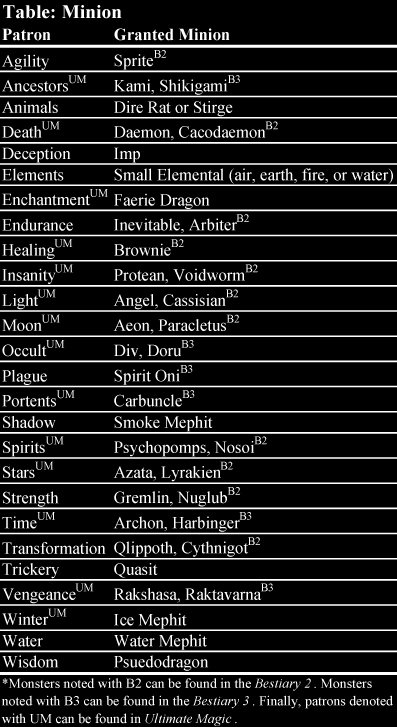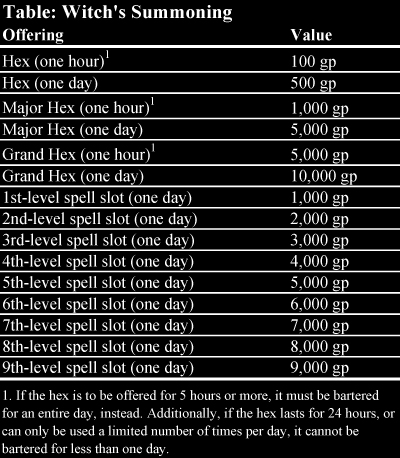The Pact-Bound Witch
Hello, and welcome to Conjuration Week. Though there are many things that can be done with spells of the conjuration school, when I hear “conjuration,” I immediately think of summoning demons and devils. Maybe it’s because that’s one of the flashiest, sexiest sorts of things that conjuration can do. Or maybe my vocation as a necromancer simply colors my perceptions. Whatever the reason, to me, conjuration means demon summoning, and making pacts with otherworldly powers. And when I think of making pacts with otherworldly powers, I of course think of the witch, whose powers come from otherworldly forces such as her familiar and her patron. Naturally you can see where we’re going here: a new witch archetype focused on summoning and interacting with otherworldly forces.
New Witch Archetype
Pact-Bound Witch
All witches consort in some way, shape, or form with otherworldly powers, but pact-bound witches take this a step further, forging an intimate relationship with her otherworldly patron and its servants, and being able to call upon such servants to aid her in her endeavors. To do this, the pact-bound witch performs a special ceremony that summons an avatar of her patron into a magic circle, and the two ritually consummate their tie. After that, the patron grants her limited access to its servants.
Summon In Spirit (Su): This ability allows the witch to perform a short ritual (which takes one minute) that calls forth the spirit of an otherworldly servant into the body of a Tiny or smaller animal. The animal must be contained in a cage or otherwise rendered helpless for the duration of the ritual, and if it succeeds on a Will save (DC 10 + ½ the witch’s class level + the witch’s Intelligence modifier) then it is immune to the effect for 24 hours. If the ritual is a success, then an otherworldly entity takes control of the animal’s body for 24 hours, or until the witch banishes the spirit, whichever comes first.
While under the effect of the ability, the animal effectively gains Intelligence, Wisdom, and Charisma scores of 14, and its alignment changes to match that of the witch. It can speak Abyssal, Celestial, Common, and Infernal. Generally, such spirits do the witch’s bidding lest the witch decides to torture them while they are in vulnerable animal bodies, and in the hopes that they may be rewarded by being given a chance to do as they please. Anything that affects possession (such as protection from evil) has the same effect on this ability. For the duration of the effect, the animal is treated as a magical beast, rather than an animal.
This ability replaces the witch’s 4th-level hex.
Minion (Su): The witch’s patron grants her an additional servant, in addition to her familiar, which remains with her and aids her as she sees fit. This servant is not actually a familiar, and does not gain any of the benefits of a familiar (including an empathic link, the ability to deliver touch spells, etc), but it can be used to store and prepare spells as though it were a witch’s familiar. The exact type of servant granted depends on the nature of the witch’s patron, as outlined below.
This ability replaces the witch’s 8th-level hex.

Witch’s Summoning (Sp): With this ability, the witch is able to call forth an emissary of her patron to aid her in a variety of ways. This functions as the spell lesser planar ally, with a few exceptions.
First, the limit on the number of Hit Dice the called outsider may possess is equal to the witch’s level.
Second, rather than payment in gold, the creature takes payment in the form of borrowing the witch’s spellcasting ability. The witch offers up access to her spell slots and/or hexes for a certain period of time (as outlined below).
As soon as an agreement is reached, the witch loses access to the bargained spell slots and hexes. Once the called creature has performed the agreed-upon task, it gains access to the spell slots and hexes the witch gave up for the agreed-upon amount of time. The time spent performing the task does not count towards this time, and the called creature cannot use the witch’s abilities during this time. That said, once the deal is struck, the witch has no way to back out and “cheat” the called creature of its access to her powers.
Giving up access to hexes and spells can be equated to the gold piece value normally used to bargain with creatures called by planar ally. The equivalent values are indicated on the table below.



